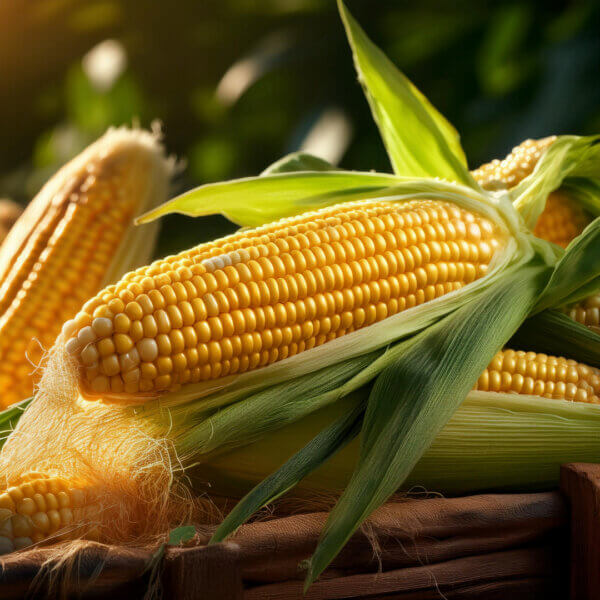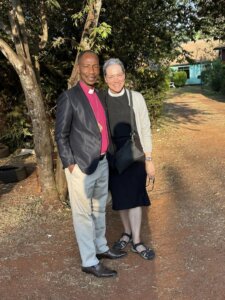
Becoming What We Pray
I hope that all of you are enjoying everything about these last days of New England summer. Summer officially turns to Fall in the third week of September, but Labor Day weekend marks the practical end of the summer season — beach and pool time, cookouts, watermelon, and long evenings with late sunsets laughing with friends and family. These rhythms of summer are built into our memories and our histories, and become part of who we are.
 At least in my family, sweet corn was a huge sign of summer, and both sides of my family took it very seriously. My maternal grandfather grew sweet corn, and every single dinner turned into a market survey. Poor Jere and his Southern manners in the face of my grandfather’s nightly dinner table focus group is a whole ‘nother story, as they say. The Brink family believed that sweet corn was not to be harvested or even shucked until the water was boiling and ready — field to table, so to speak, and absolutely as fast as possible.
At least in my family, sweet corn was a huge sign of summer, and both sides of my family took it very seriously. My maternal grandfather grew sweet corn, and every single dinner turned into a market survey. Poor Jere and his Southern manners in the face of my grandfather’s nightly dinner table focus group is a whole ‘nother story, as they say. The Brink family believed that sweet corn was not to be harvested or even shucked until the water was boiling and ready — field to table, so to speak, and absolutely as fast as possible.
My father’s family, the Wagers, loved sweet corn just as intensely and ate it almost every night of Watertown’s very short summer season, which usually ended abruptly with frost or even snow sometimes the weekend after Labor Day. The Wagers swore by a different method of preparation: corn was shucked every night by the kids, which was a huge part of the ritual, and placed in the big pot on the stove in cold water. Once loaded with at least two or three ears of corn for everyone, the pot was turned on high heat and brought to a boil. The minute it boiled, the corn was perfectly done.
For the record, my favorite varietal is Silver Queen, but I swear by the Wager corn prep method. You can see where this takes us. We had a food fight on our hands. The main thing was the sweet corn, and how much we all loved it, and how central it was to who we were in those long, idle days of summer. But, boy, could we could get ourselves in a knot about the process! Inter-family contestations became the main thing, overshadowing the sweet corn, and worse yet, the family it was supposed to be feeding.
Washing Hands
 This is what Jesus is talking about in Mark’s gospel this morning, when the Pharisees ask Jesus why his disciples are eating without washing their hands. Just to be sure the point is clear, even to Mark’s mixed audience of Jews and Gentiles, and to us listening in now, he even stops to explain in detail in the text the long-held traditions of the Pharisees:
This is what Jesus is talking about in Mark’s gospel this morning, when the Pharisees ask Jesus why his disciples are eating without washing their hands. Just to be sure the point is clear, even to Mark’s mixed audience of Jews and Gentiles, and to us listening in now, he even stops to explain in detail in the text the long-held traditions of the Pharisees:
(For the Pharisees, and all the Jews, do not eat unless they thoroughly wash their hands, thus observing the tradition of the elders; and they do not eat anything from the market unless they wash it; and there are also many other traditions that they observe, the washing of cups, pots, and bronze kettles.)
It’s important to remember that the Pharisees were not bad people. They were people like us — lectors, choir members, counters, flower guild, altar guild, ushers, and folks in the pews. They had worked hard to learn, and keep, the religious traditions that had been passed down through generations and become part of their very identity and sense of belonging.
Jesus kind of flies off the handle at the Pharisees’ handwashing question, even calling them hypocrites and quoting the prophet Isaiah at them, which is a major rebuke. I can just hear my grandmother wagging her finger and saying don’t make me come over there and quote Isaiah at you! Jesus speaks strongly because this is an enormously important point for him. We can see this in the care that Mark’s gospel takes to set up the basis for the conflict. (And besides, you should have heard my Grampa Brink’s imperious tone as he tried to get my amiable, polite Southern fiancé to express a preference for Butter & Sugar or Silver Queen corn).
Human Traditions Around Keeping the Commandments
As preacher Tom Long writes, We can see we’ve walked into a food fight, but what is this really about? Something far more serious than handwashing stands at the core of Mark’s story. It is not about having human traditions around how we keep God’s commandments, but about the irony of using moral posturing to sidestep the commandments altogether. It is about keeping our hands ritually washed while being up to our elbows in evil. Jesus is telling us to keep the main thing the main thing.
So how do we do that, especially in this critical season we’re in now, as we prepare to elect a president and manage and balance the tough issues in front of us — The escalating Hamas-Israel war, the war in Ukraine, and wars all over the world with both local and global drivers and consequence. Affordable housing. Hunger. Education. Access to healthcare. Safe Migration. Equity and dignity for all peoples, and economies and a Rule of Law that sustainably support all of these human and environmental needs?
These are tough issues, and of ultimate consequence. I don’t think anyone knows the best or the only way to solve them, but I do believe with all my heart that we’ve come to the right place to prepare ourselves to make good choices about our leaders and approaches to these issues that matter so much. There’s an ancient principle in the Church: lex orandi, lex credendi, translated, the law of prayer is the law of faith. More plainly, the words we pray express what we believe, and our prayer shapes how we live out our beliefs.
Increase in Us True Religion
We prayed in the Collect of the Day this morning To increase in us true religion, which is a prayer that we may conform our lives to our prayers — actually becoming what we pray — and living out our faith. Faith is praying ourselves into a future and a way of walking around in the world, that Presiding Bishop Michael Curry calls of love, and of God. Faith is the habit — the discipline — of remembering who and whose we are, and interacting with everyone we encounter from that place.
Listen to our prayers this morning. Listen to who we say we are, and what we pray we’ll be, and what we say matters to us — it all comes right from scripture. Remember what we pray every time we renew our baptismal covenant: To try every day to do the next right thing, say sorry when we’re wrong and do better next time. To be a walking example of God’s good news of belonging and inclusion. To love our neighbors as we love ourselves, even when our neighbors think, live, and vote differently from us. And here’s the biggie: To strive for justice and among all people, and to respect the dignity of every human being.
 Our friend Bishop Emmanuel Bwatta of the Diocese of Western Tanganyika — DWT — emailed this week with news of Tanzania’s local government elections coming up in November. As a church and community leader in his context, Bishop Emmanuel provides civil and constitutional education to prepare the whole community — Anglican, Pentecostal, Muslim, and completely secular — for the November election. He writes, As you know, in elections in Africa (Tanzania included) often bribery and unfairness are common. I have started talking against these actions in churches and in community gatherings. Still, there is much work to be done from now until November. I do think we should walk with, and pray with, our friend Bishop Emmanuel and DWT as we approach our own important elections in November.
Our friend Bishop Emmanuel Bwatta of the Diocese of Western Tanganyika — DWT — emailed this week with news of Tanzania’s local government elections coming up in November. As a church and community leader in his context, Bishop Emmanuel provides civil and constitutional education to prepare the whole community — Anglican, Pentecostal, Muslim, and completely secular — for the November election. He writes, As you know, in elections in Africa (Tanzania included) often bribery and unfairness are common. I have started talking against these actions in churches and in community gatherings. Still, there is much work to be done from now until November. I do think we should walk with, and pray with, our friend Bishop Emmanuel and DWT as we approach our own important elections in November.
While our context and Constitution is different Stateside, and it’s less likely here that the wider community would look to the church as a source of guidance in civic literacy and the foundations of wise and fair electoral choices, our faith, and our prayers, should shape and guide us — as we engage in political conversations with friends and family, as we read and watch news, political rallies, and enter the voting booth. If it’s not of love, it’s not of God. As writer Anne Lamott more crisply says, if it turns out that God hates all the same people you do, you can safely assume that you’ve created God in your own image. Listen to our prayers. We will become what what we pray, so let us be, as we heard today in James’s letter, doers of the word, not merely hearers of the word. Amen
